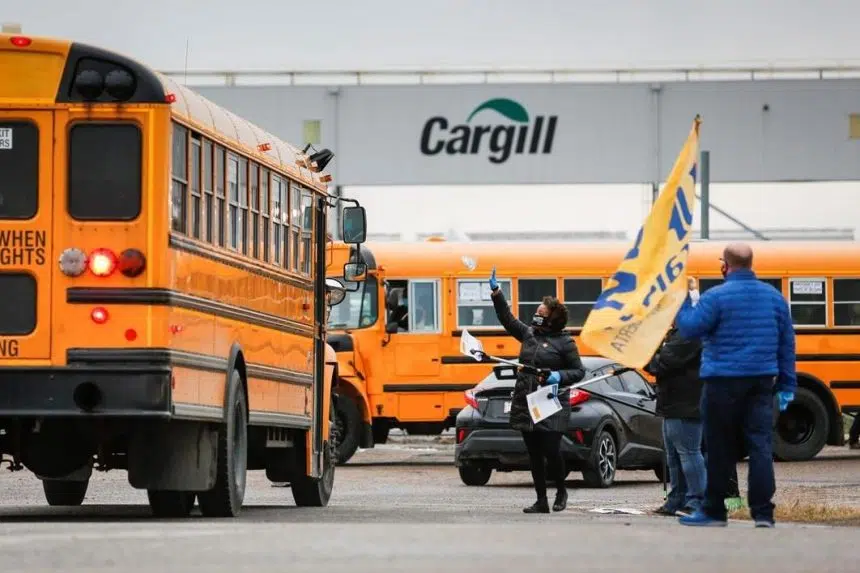HIGH RIVER, Alta. — A large meat-packing plant in southern Alberta reopened for business Monday, two weeks after it was shut down due to an extensive outbreak of COVID-19.
A long line of cars and buses waited to enter the Cargill plant near High River, south of Calgary. The plant was closed temporarily on April 20.
The union that represents the workers held a rally on the edge of the property and handed out black facemasks emblazoned with “Safety First” to anyone who needed them.
“We have hundreds here for anyone who wants them,” said Thomas Hesse, president of the United Food and Commercial Workers Local 401.
“People are scared. They’re not coming to work. It’s a problem for everyone.”
There have been more than 900 cases of the illness and one death among the 2,000 workers at the slaughterhouse.
The plant processes about 4,500 head of cattle a day — more than one-third of Canada’s beef-packing capacity.
The union, arguing conditions are unsafe for workers, is seeking a stop-work order at Cargill. Hearings before the Labour Relations Board began on the weekend and are continuing.
“We’d like to see proper personal protection equipment. We’d like to see daily, ongoing health and safety meetings,” said Hesse. “These places are hundreds of thousands of square feet with all sorts of nooks and crannies, and the company really needs to respect the voice of the workers and what they have to say.”
A statement from Cargill said all employees who are “healthy and eligible to work” have been asked to report for work at the plant’s two shifts.
“According to health officials, the majority of our employees remain healthy or have recovered. We are grateful for our workers’ dedication and resilience as our plant and community walks through this heart-wrenching pandemic,” said the statement.
“Alberta Health Services will be on-site and we will conduct our ongoing screening to safeguard employees and ensure no one exhibiting symptoms enters the facility.”
Cargill is limiting plant access to no more than two people per car, one in the front and one in the back. It is also providing buses with protective barriers to reduce the need for carpooling.
Barriers have also been added in bathrooms and lockers have been reassigned to allow for enough spacing.
Hesse said it is important that Cargill listen to the concerns of its workers.
“These workers will not be invisible and this issue will not be invisible,” Hesse said. “Cargill is really bringing a lot of shame to the province of Alberta and Albertans aren’t going to tolerate it.”
Bill Graveland, The Canadian Press







